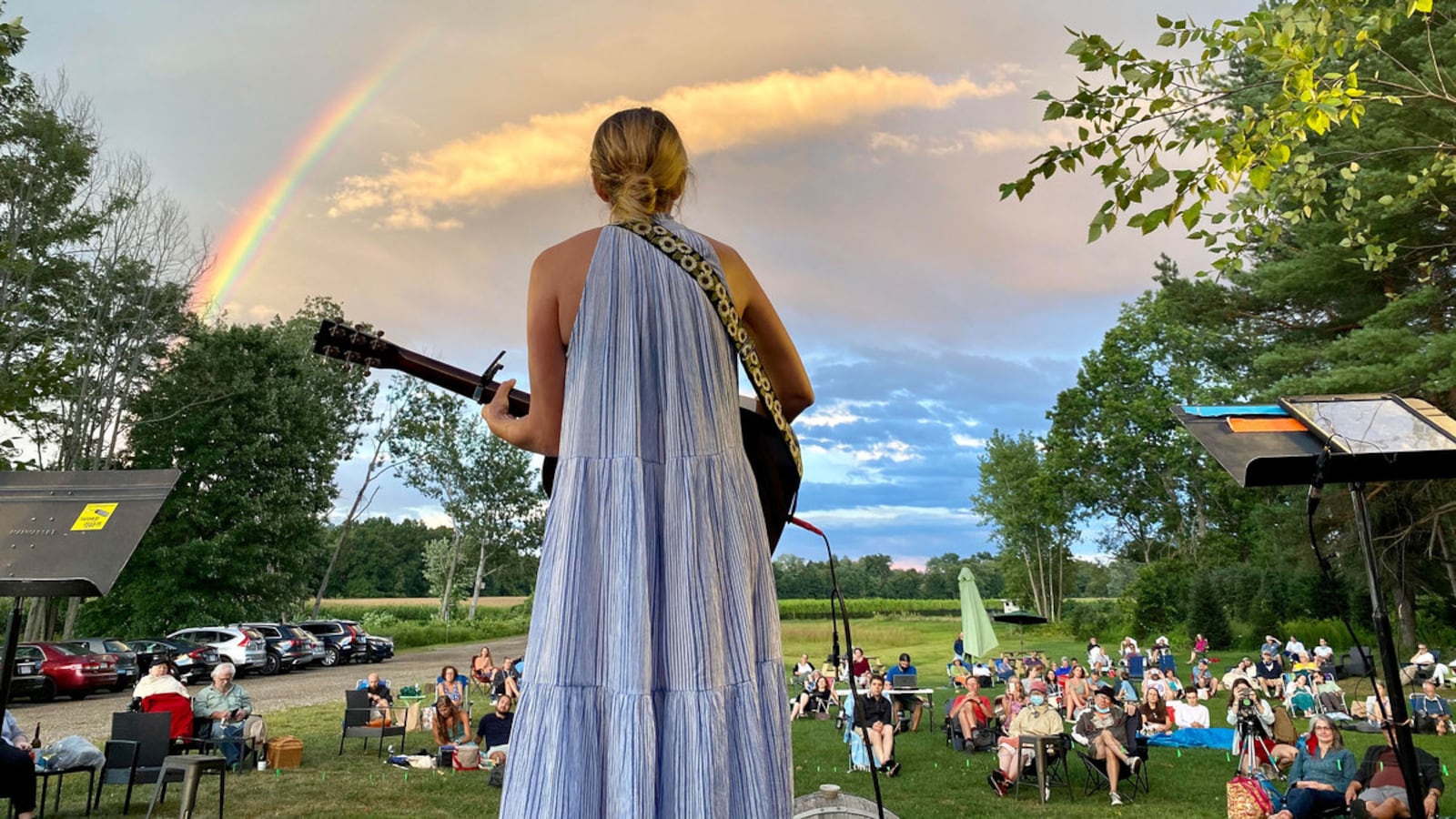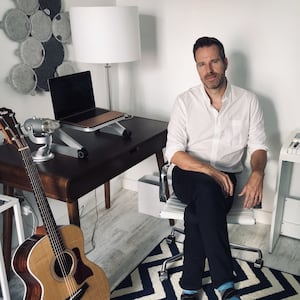As America transitioned to “working from home,” musicians took up songwriting sessions on Zoom, live shows on YouTube, jam sessions uploaded to SoundCloud, and recording via a Dropbox full of LOGIC files—but is it truly working from home if you’re not getting paid?
Nicole Atkins and her band were geared up to tour for the release of her fifth studio album Italian Ice, out May 29. But when the pandemic hit, starting with the cancellation of South by Southwest, every other paying gig on their calendar vanished overnight. Two members of her touring band took up jobs for $7/hour at a tobacco shop in Muscle Shoals, Alabama, pinch-hitting their way through the sudden lack of income.
Atkins was home in Nashville, scheming on a plan to get them their jobs back.
Inspired by the MTV variety shows of her youth, Atkins decided to start doing shows out of her attic, recording them on her laptop and live-streaming them to YouTube. “At first it felt stupid and vain, and like ‘Why should my record matter right now?’” she told The Daily Beast, “But times are really heavy. People need a little dose of fun.” Plus, she thought, it just might work.
Her husband, sound engineer Ryan McHugh, had been on tour with Weyes Blood in New Zealand just as travel came to a halt in March and he, too, was at a loss for how to “work from home.” When Atkins launched her show, “Live from the Steel Porch,” he picked up a new audio interface and taught himself how to mix through his laptop in order to run sound. The pair also temporarily repurposed their kitchen as a painting studio for backdrops for the set.

Nicole Atkins performs against backdrops fashioned from wedding decorations in a Twitch series she launched out of her Nashville guest bedroom.
Courtesy Nicole AtkinsAccording to Atkins, monetizing one’s music online has been unlikely, if not downright fantastical for years. “Spotify and other streaming services have literally taken livelihoods away from 90 percent of musicians,” Atkins said, explaining that subscriptions paid to those platforms primarily go to the top few artists and major labels, while everyone else is virtually giving music away when they post it online. So, a digital show was a long shot, but it worked: “I saw all these people online, starting to tune in, telling me ‘I needed this today,’” she said. “And then, there’s Amazon watching it.”
Within a few episodes, a scout for Amazon Music had reached out and asked Atkins to host a show on their Twitch channel. The pay was enough to bring her bandmates to set, and the trio performed live, with McHugh on sound, between Zoom appearances from guests like Britt Daniel (Spoon), Kurt Vile, Nathaniel Rateliff, Chris Isaac and Jason Isbell, all beaming in from their own quarantines. Additional guests, like Shilpa Ray, Danny Clinch, and Nicole’s parents when she spent part of the summer back home in Asbury Park, appeared live. The line-up has been the easy part, she said: “Everybody’s home.”
“Sometimes shit breaks or the internet craps out, but we just roll with it,” she said. “I’ve spent so much time in a band that never had any tech people, so I’ve spent a lot of time on stage working on my comedy chops while other band members are fixing a broken string or replacing a kick drum pedal.”
Of course, the tour-to-Twitch formula hasn’t worked for everyone.
Tim Mislock, ambient musician and cast member of Broadway’s Hedwig and the Angry Inch, was gearing up for a run of live shows organized by Hedwig creator John Cameron Mitchell. When those were COVID-canceled, Mislock tried Twitch performances, but it didn’t really take: “Watching an ambient music performance is a hard sell when you’re in the room, let alone on the internet,” he told The Daily Beast.
He turned his energy to a series of daily improvised pieces on Soundcloud called With Love. For this he collaborated with former bandmate Peter Silberman (The Antlers), Heather Woods Broderick (Sharon Van Etten), and fellow Hedwig cast members, sending Logic files back and forth. “The idea is to work quickly, and if sparks inspiration, cool—it’s something creative to focus on at a time when it feels strange to be creative.” It hasn’t supplanted tour income, but it has laid the foundation for his forthcoming album.
Meanwhile, in Louisiana, Cajun band The Revelers didn’t jump head-first into “the virtual thing.” With music made for dancing, these Grammy nominees’ bread and butter was live shows. (“I’d rather be a fucking farmer than a virtual musician,” the saxophonist declared in a band heart-to-heart in March.) But since the state outlawed indoor live music this spring followed by a shocking ban on dancing in August, this is the longest period of time that Revelers’ fiddle player Daniel Coolik has been in one place in more than a decade.
“If you’re not actively entertaining then it’s like you don’t exist, which is part of the reason I love being a musician,” said Coolik, who is also the leader of Congolese rumba band Boma Bango and a number of other swamp pop ensembles. “But at a time like this, that’s the worst thing about it.”
He took up teaching string instrument lessons on Zoom, and he and percussionist Glenn Fields channeled some of their creative energy (and their longing for the road) into a podcast about middle-of-the-road touring musicians (“Stories from the Middle”), which they each record from home, and which required the purchase of an interface and some mics, and the acquisition of a new set of skills on Skype.
“At least personally, the idea of putting on a regular show in front of the camera feels weird,” he told The Daily Beast. “This band is about like dancing, and the interaction with the audience.” Nevertheless, The Revelers will play their first set together since the cancelation of their March tour. It will be a recorded set for a virtual edition of this year’s Festival Acadiens, airing Oct. 9-11. Their only audience will be camera operators and crew.
For musician Chloë Nixon, the pandemic hasn’t changed her life on the surface. She still lives with her parents in Albuquerque, has regular meetings with her artist team via Zoom, and attends high school online like she was doing before because of the demands of her music career. When George Floyd died, she couldn’t sleep. She wrote “I Can’t Breathe,” had her mom shoot a video in the yard that was released online the next day and featured by NPR’s All Songs Considered.
“Right now, I think, because of the pandemic, people are so willing to listen,” she told The Daily Beast. “I’ve seen amazing responses from people, and people reaching out to me telling me how touched they’ve been. And it’s been a very, very beautiful thing to have so much support for this cause and for my people. The momentum has been huge during this time.”
Other musicians have found this to be a creatively fruitful time, too, like solo artist Tod Lippy, producing his second album remotely by exchanging Logic files with producer Kramer (Galaxie 500, Low), or like Charles Bissell of The Wrens, who used this time to finish an album he has been working on for a decade. But most bands can’t imagine a world without live shows.
After Aiofe O’Donovan and bandmates Sarah Jarosz and Sara Watkins took home a Grammy for their folk trio I’m With Her in 2018, she turned her attention to a new solo album with Yep Roc and an international tour along with it. But after two rehearsals with the band this March, show cancellations rolled in.
At home, she turned her focus to working on her next album and to playing with her husband Eric Jacobsen and brother-in-law Colin Jacobsen—who themselves comprise acclaimed chamber music duo The Knights. The trio has recorded live performances from their kitchen table in Brooklyn surrounded by toddlers’ toys and near-empty wine glasses and staged music videos in their apartment building’s courtyard.
But digital shows are just a stop-gap: She is anxious to get in front of live audiences again. “I’m a touring musician; that’s what I do,” she told The Daily Beast.
Soon her husband Eric will make his own return to live music; as musical director for the Orlando Philharmonic Orchestra, he is being summoned to Florida as the phil prepares to resume performances at the end of the summer. While the planning may take place over video conference, he’ll be live again in just a few weeks—albeit outdoors, in a soccer stadium.
“I don’t have any fear that live music won’t come back,” Donovan said. “I think that’s really important for lovers of live music and the arts in general to remind ourselves: Live music is just such a part of the fabric of humanity and it always has been. The need for it is a great need—and it will still be there after the pandemic.”






